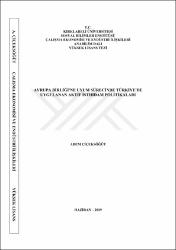Avrupa Birliği'ne Uyum Sürecinde Türkiye'de Uygulanan Aktif İstihdam Politikaları

View/
Access
info:eu-repo/semantics/openAccesshttp://creativecommons.org/licenses/by-nc-nd/3.0/us/Date
2019Metadata
Show full item recordCitation
Çiçeksöğüt, A. (2019). Avrupa Birliği'ne Uyum Sürecinde Türkiye'de Uygulanan Aktif İstihdam Politikaları, Kırklareli Üniversitesi Sosyal Bilimler Enstitüsü, KırklareliAbstract
Avrupa Birliği'nde istihdam politikaları 1990'lı yıllardan sonra önem kazanmaya başlamıştır. 1990'lı yıllara kadar işsizliğe yönelik olarak, işsizliğin yarattığı olumsuzlukları gidermek amacıyla pasif işgücü piyasası politikalarının uygulanması yeterli görülmüştür. Ancak; Avrupa Birliği'nde işsizlik zaman içerisinde artış göstermiş ve çözülmesi gereken bir problem halini almıştır. Bu nedenle; 1990'lı yıllardan sonra Beyaz Kitap ile işsizliği azaltmaya yönelik çalışmalar başlamış ve Avrupa İstihdam Stratejisi'nin oluşturulması sağlanmıştır. Böylelikle; işsizliğin yarattığı sorunları azaltmak amacıyla uygulanan pasif işgücü piyasası politikalarından, işsizliği azaltmak amacıyla uygulanan aktif işgücü piyasası politikalarına geçilmeye başlanmıştır. Türkiye'de de işsizlik, 2000'li yıllara kadar kalkınma planları çerçevesinde, ekonomik büyüme ile çözülebilecek bir sorun olarak ele alınmıştır. 2000'li yıllardan sonra ise özellikle AB uyum süreci dikkate alınarak, işsizliği azaltmaya yönelik önemli çalışmalar yürütülmüş, böylelikle aktif işgücü piyasası politikalarına geçiş sağlanmıştır. Bu çalışmada; Avrupa Birliği'ne uyum sürecinde Türkiye'de uygulanan aktif işgücü piyasası politikaları ele alınmış, Avrupa Birliği'nde istihdam politikalarının gelişimi analiz edilmiş ve bu bağlamda Türkiye'de uygulanan aktif işgücü piyasası politikaları incelenmiştir. Çalışmanın amacı; Türkiye'de uygulanan aktif işgücü piyasası politikalarının, Avrupa Birliğine uyum sürecinde başarısını değerlendirmek ve öneriler sunularak işsizliği önlemeye yönelik gerçekleştirilecek çalışmalara katkı sağlamaktır. The unemployment has not been seen as a serious problem in the European Union before the 90's. For this reason, the passive workforce market policies have been adequate to deal with unemployment. Also, the unemployment has not been reduced but has become a bigger problem. After the 90's the attempts to reduce the unemployment beginning with the White Book, have led the formation of the European Employment Strategy. So, a transition from the passive workforce market policies that aim to deal with the outcomes of unemployment to active workforce market policies that aim to reduce the unemployment has occurred. The unemployment is a serious problem in Turkey on today. The unemployment in Turkey has been seen as a problem to be solved through the economic growth with reference to the development plans since the 2000's. After the 2000's, some serious attempts with regard to the EU harmonization process have been made to reduce the unemployment and the active workforce market policies have been pursued. In this case, the active workforce market policies in Turkey in the EU harmonization process is approached. The development of the employment policies in the EU is investigated. The aim of this case is to evaluate the success of the active workforce market policies in Turkey in the EU harmonization context and contribute to the studies to prevent the unemployment.
Collections
- Tez Koleksiyonu [311]
The following license files are associated with this item:



















